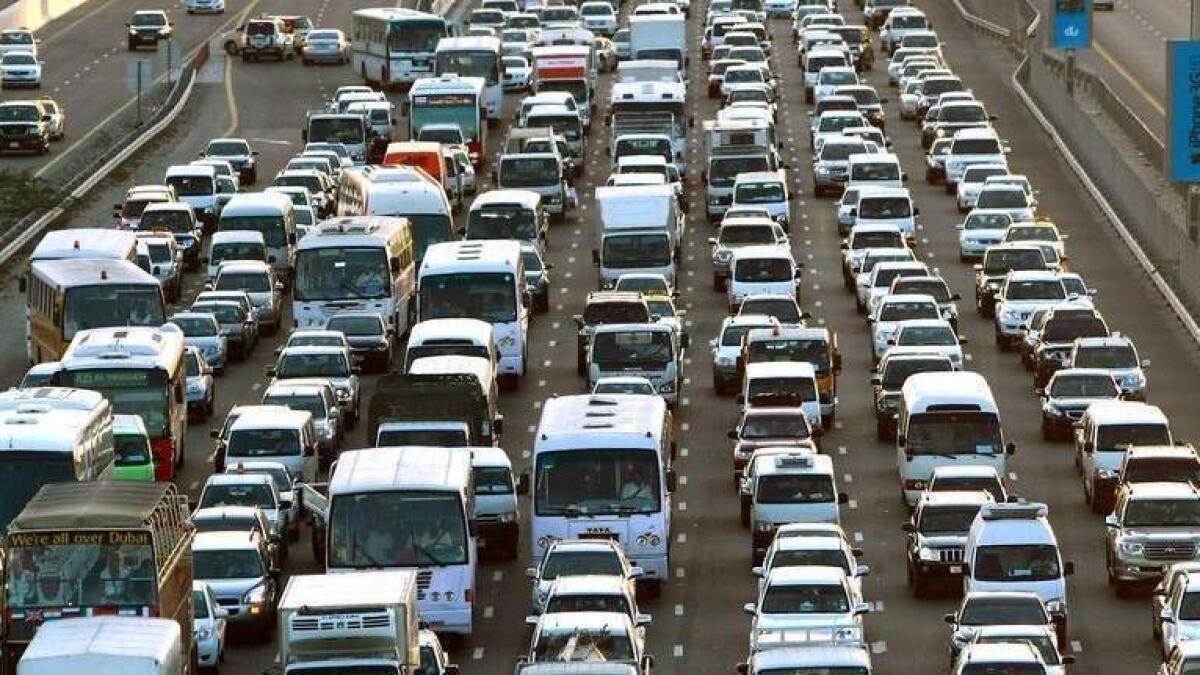
UAE Traffic: Would An 'Odd-Even Scheme' Help Ease Peak-Hour Jams?
Last updated: Fri 30 Aug 2024, 7:36 AM
Motorists and commuters have observed road congestion has worsened these past few days with the re-opening of schools and return of residents from their summer holidays.
Roads in the UAE are generally wide and well-maintained but the sheer volume of vehicles create traffic jams, especially during rush hour. In fact, the country has one of the highest car ownership rates in the world, with many residents believing private vehicles are essential for daily commutes.
In Dubai, for instance, registered vehicles with Salik tags now stand at 4.2 million , up by 8.8 per cent as compared to the first six months of last year. Registered active accounts, meanwhile, increased by 14.6 per cent year-on-year – or about 2.5 million at present as compared to around 2.2 million in the second quarter of 2023.
Stay up to date with the latest news. Follow KT on WhatsApp Channels.
Five years ago, Khaleej Times reported – as per data provided by the Roads and Transport Authority (RTA) – that there was one car for every two residents, or 540 vehicles per 1,000 people; while cities like New York, London, Singapore, and Hong Kong respectively had 305, 213, 101 and 63 vehicles per 1,000 residents.
In 2006, less than two decades ago, the number of registered vehicles in Dubai stood only at around 740,000. This doubled to 1.4 million in 2015, and reached 1.83 million by 2020. At present, estimates suggest there are around 3 million cars moving around Dubai on busy week days, including cars coming from neighbouring emirates.
So, the question is: Would it help if we removed a certain number of cars off the road on certain days of the week to reduce traffic? Would an 'odd-even scheme' – that is being implemented in some major cities in the world – help ease peak-hour jams?
Road space rationingDr Monica Menendez, associate dean of Engineering for Graduate Affairs at New York University Abu Dhabi (NYUAD), explained:“The odd-even scheme – also called road space rationing – simply takes some cars out of the road on different days of the week, depending on the ending number of the license plate.”
This means vehicles with car plates ending in 1 and 2, are not allowed on the road on Monday; 3 and 4 on Tuesday; 5 and 6 on Wednesday; 7 and 8 on Thursday; 9 and 0 on Friday. All vehicles are allowed on the road on Saturday and Sunday, which are weekends.
Dr Monica Menendez. Photo: Supplied“The scheme has been implemented in multiple cities around the world, including Mexico City, Athens, and Beijing. While some cities have used it on a permanent or semi-permanent basis, other cities have used it only on specific days. The policy, often implemented to mitigate air pollution, has seen different levels of success,” she told Khaleej Times.
Pros and cons of the schemeDr Menendez noted:“In theory, the odd-even scheme is a very direct and relatively easy way –assuming the right level of enforcement – to remove cars from the roads and mitigate traffic congestion and air pollution.”
“It would seem equitable – since everyone is potentially affected the same, independent of their income or social status. However, this is not necessarily the case, as households with more cars are typically less affected,” she added, explaining:“The policy might cause that people with more means end up buying more cars, and continue moving by private transportation every day of the week.
“This could actually lead to higher vehicle ownership rates, a larger demand for parking, etc,” said the NYUAD professor of civil and urban engineering, who is also director at Research Centre for Interacting Urban Networks.
Targeted approachThe question now is: How can odd-even scheme be effectively implemented in a metropolitan city like Dubai?
Dr Menendez suggested:“One option – rather than implementing the odd-even scheme city-wide – would be to implement it on specific roads or areas of the city.
“Either way, it is crucial to ensure that people have alternative options to move around. Thus, improving public transportation and other alternative transportation modes seems the key,” she added.
Meanwhile, in a previous story by Khaleej Times earlier this month, transportation experts and urban planners also shared their views on rolling out congestion charge or tariff on motorists to enter and drive around busy areas at certain times of the day. In some parts of the world, it is being used to reduce traffic, cut pollution, and raise money for mass transit.
Dr Menendez, however, underscored:“There is no single strategy that can solve all traffic-related problems. Thus, we should think about a combination of strategies aiming to improve the efficiency of both the road transportation system and other alternative transportation modes, while deploying schemes that discourage the use of cars by promoting more sustainable and climate-friendly modes of transit.
ALSO READ:
-
New Salik gates in Dubai: Business Bay to be one of the busiest tolls
-
Dubai: New 3-lane bridge now open, easing traffic towards Al Khail Road
-
Dubai: Dh4 standard Salik toll gate rate has 'lost momentum'; official suggests 'dynamic pricing'
-
2 new Salik gates: Company to pay Dh2.73 billion to RTA for new toll gates
-
Dubai: Travel time cut by 50% for 2 communities as RTA completes road works

Legal Disclaimer:
MENAFN provides the
information “as is” without warranty of any kind. We do not accept
any responsibility or liability for the accuracy, content, images,
videos, licenses, completeness, legality, or reliability of the information
contained in this article. If you have any complaints or copyright
issues related to this article, kindly contact the provider above.


















Comments
No comment